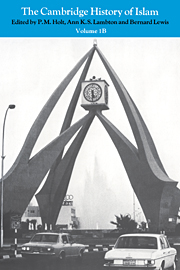Book contents
- Frontmatter
- Introduction
- Part IV The central Islamic lands in recent times
- 1 Modern Turkey
- 2 The Arab lands
- 3 Modern Persia
- 4 Islam in the Soviet Union
- 5 Communism in the central Islamic lands
- 6 The Political impact of the West
- 7 Economic and social change
- Dynastic lists
- Bibliography
- Glossary
- Index
- References
2 - The Arab lands
from Part IV - The central Islamic lands in recent times
Published online by Cambridge University Press: 28 March 2008
- Frontmatter
- Introduction
- Part IV The central Islamic lands in recent times
- 1 Modern Turkey
- 2 The Arab lands
- 3 Modern Persia
- 4 Islam in the Soviet Union
- 5 Communism in the central Islamic lands
- 6 The Political impact of the West
- 7 Economic and social change
- Dynastic lists
- Bibliography
- Glossary
- Index
- References
Summary
Political developments: 1918–48
The Arab lands of the Near East which were part of the Ottoman empire for nearly four hundred years, fell under Allied military occupation by the end of 1918. Great Britain and France had in their hands the destiny of the twin historic capitals of the once mighty Muslim empire: Damascus of Umayyad fame, and Baghdād of ‘Abbasid grandeur. And, for the first time since the Crusades, Jerusalem and, indeed, the whole of Palestine were occupied by a Christian power. The Arab nationalist leaders’ joy at the liberation of their lands from what they called the Turkish yoke, soon turned to disillusionment, righteous anger and even hostility when the truth became widely known, i.e. the existence of certain agreements and correspondence, whereby the former Arab provinces of the Ottoman empire—Iraq, Syria, Lebanon and Palestine—were to be divided between the British and French governments. Iraq and Palestine (with Transjordan) were to be under direct British military rule. France was to be installed in Syria and Lebanon. An Arab government was, however, established in Damascus early in October 1918. The story of this government, the establishment of which was due to unexpected circumstances, and the special case of Lebanon which clung to its own independence—special because of its religious and social background and because of its cultural and economic ties with the West—deserve to be related briefly.
- Type
- Chapter
- Information
- The Cambridge History of Islam , pp. 566 - 594Publisher: Cambridge University PressPrint publication year: 1977

